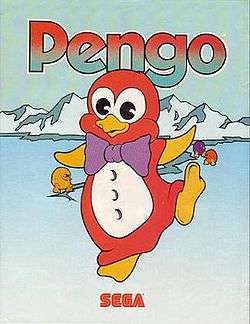Pengo (video game)
| Pengo | |
|---|---|
 Pengo arcade flyer | |
| Developer(s) | Coreland |
| Publisher(s) | Sega |
| Designer(s) | Nobuo Kodera, Tsutomu Iwane, Akira Nakakuma, Shinji Egi |
| Platform(s) | Arcade |
| Release date(s) | September 1982 |
| Genre(s) | Maze, Puzzle |
| Mode(s) | One or two players, alternating play |
| Cabinet | Upright |
| Arcade system | CPU: Z80 |
| Display | Raster graphics, standard resolution 224 x 288 (Vertical) |
Pengo (ペンゴ) is an arcade game developed by Coreland and published by Sega in 1982. The player controls Pengo, a red penguin that resides in the Antarctic. The game takes place in an overhead maze made of ice blocks, where Pengo fights the trolling, blob-like Sno-Bees. The objective of the game is for Pengo to survive a series of rounds by eliminating all Sno-Bees, while amassing bonuses by bringing together the three diamonds dispersed in the maze.
There are two versions of the arcade game, each with different music. The first uses "Popcorn" as the theme, and the second has original music. There are other small differences as well.[1]
Pengo was ported to the Atari 2600, Atari 5200, Atari 8-bit family, Commodore 64, and Sega Game Gear.
Gameplay
The player uses a joystick and a single button to control Pengo, a penguin character. Pressing the button while pushing the joystick will cause Pengo to push forward the ice block he is facing, which will slide until it hits a wall or another ice block, crushing any intervening Sno-Bees. Crushing more than one Sno-Bee at once will increase the number of points awarded. There are a total of sixteen levels, which repeat in order starting on the seventeenth round.
As the player crushes those on patrol, new Sno-Bees hatch from eggs located within ice blocks. At the start of each level, blocks that contain these eggs are briefly identified by flashing the color of that level's Sno-Bees. Eggs can be eliminated by crushing the ice blocks that contain them. If Pengo pushes a side wall the water "vibrates", any adjacent Sno-Bees will be briefly stunned, and are eliminated if Pengo walks over them in this state. Eliminating all Sno-Bees in a round will progress the player to the next. Diamond blocks are unbreakable and the player earns bonus points for connecting them in a horizontal or vertical line (with a higher bonus paid out if the row is not against a wall). This will also temporarily stun all Sno-Bees. After 60 seconds elapse in a round without a death, the game enters into sudden death mode; the music tempo and movement of the Sno-Bees accelerates. If a single Sno-Bee remains in the round, a jingle plays and the Sno-Bee accelerates in an attempt to reach a corner where it safely fades away. In a manner similar to Pac-Man, one of six brief intermissions plays on even-numbered rounds after the bonus is awarded.
Legacy
In 1982 and 1983 Bandai Electronics created two[2][3] official SEGA licensed handheld games featuring Pengo. The first was an LCD pocket game, the second a VFD table top version. In 1995 a brand new game called Pepenga Pengo was released for the Sega Mega Drive only in Japan.
In 2010 a location test for the wide screen remake was announced in arcades, which features eight player multiplay.[4][5] A second location test took place at Sega Shinjuku Nishiguchi in May 2012.[6] During the 3rd location test at Club Sega Akihabara Shinkan between 2012-07-14 and 2012-07-16 as part of the 4-game compilation title named 'Ge-sen Love. ~Plus Pengo!~' (ゲーセンラブ。~プラス ペンゴ!~),[7] where the game was made available as a download by RINGEDGE2 machines through Sega's new ALL.NET P-ras Multi game network,[8][9] and was later released on 2012-09-20.[10] The compilation title is included with the Xbox 360 game 'Ge-sen Love. ~Plus Pengo!~'.[11][12][13]
Pengo clones include Pengi for the BBC Micro and Acorn Electron, Percy Penguin for the Commodore 64, Block Buster for the Commodore VIC-20, Chilly Willy for the Microbee,[14] Pengon for the Atari 8-bit family,[15] and Freez'Bees for the ZX Spectrum.[16] Capcom's 1991 game Don't Pull (part of Three Wonders) is another Pengo clone.
References
- ↑ "Pengo High Score Save & Enhancement Pack". Arcadeshop.com. Retrieved 2015-04-30.
- ↑ Jaro Gielens. "Electronic Plastic: a museum of handheld and tabletop games from the 1970s and 1980s". Handhelden.com. Retrieved 2015-04-30.
- ↑ Jaro Gielens. "Electronic Plastic: a museum of handheld and tabletop games from the 1970s and 1980s". Handhelden.com. Retrieved 2015-04-30.
- ↑ "'˝?l?"ƒvƒŒƒC‚މÂ"\‚É‚Č‚Á‚˝ wƒyƒ"ƒS I x‚Ěƒ ƒfƒBƒA'Î?R?í‚ŞŠJ?Ă - ƒtƒ@ƒ~'Ę.com". Famitsu.com. 2010-07-30. Retrieved 2015-04-30.
- ↑ "Five New Arcade Games To Get Excited About". Kotaku.com. Retrieved 2015-04-30.
- ↑ "ロケテスト - シューティングラブログ。". Triangleservice.co.jp. 1999-02-22. Retrieved 2015-04-30.
- ↑ "ロケテ - シューティングラブログ。". Triangleservice.co.jp. 1999-02-22. Retrieved 2015-04-30.
- ↑ Am-show.sega.jp Archived July 16, 2013, at the Wayback Machine.
- ↑ "3 Newsfeeds For The Price Of 1: Sega launches ALL.NET+ Multi, Fantastic Arcade, Midway Classics". Arcade Heroes. 2012-09-24. Retrieved 2015-04-30.
- ↑ "ゲーセンラブ。〜プラス ペンゴ!〜[ARCADE]". 4Gamer.net. 2012-09-20. Retrieved 2015-04-30.
- ↑ "祝、Xbox 360版『ゲーセンラブ。~プラス ペンゴ!』移植決定! 藤野社長×石井ぜんじ特別対談! - ファミ通.com". Famitsu.com. 2014-01-20. Retrieved 2015-04-30.
- ↑ "Game Center Love Plus Pengo Will Test Your Arcade Skills". Siliconera. 2014-01-02. Retrieved 2015-04-30.
- ↑ "Xbox 360『ゲーセンラブ。~プラス ペンゴ!~』発売! | トライアングル・サービス". 124.146.199.138. Retrieved 2015-04-30.
- ↑ Passfield, John. "My Games". Passfield Games.
- ↑ "Pengon". Atari Mania.
- ↑ "Freez'Bees". World of Spectrum.
External links
- Pengo at the Killer List of Videogames